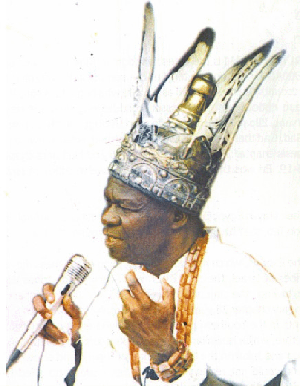African History
NRI KINGDOM: THE ANCIENT TOWN WITH DEEP HISTORY AND LEGACIES
INTRODUCTION

Nri is one of those towns that will always stand out whenever the talk about the roots of Igbo civilization comes up. This ancient town in southeastern Nigeria is one of the oldest and most culturally powerful centres in Igbo history. But this is not just a random town in the map of Anambra State, it represents a living symbol of how moral authority, spiritual power, and peaceful influence can hold a society together for centuries.
Long before Nigeria became a nation, a quiet but powerful civilization flourished in the heart of Igboland – the Nri Kingdom. Known as the spiritual and cultural capital of the Igbo people, Nri is not just an ancient town, it is the birthplace of many traditions, values, and systems that still shape Igbo society, even today. From its divine founder Eri to its peaceful priest-kings known as the Eze Nri, this remarkable town built a kingdom, not based on war or weapons, but on truth, morality, and spiritual authority.
Exploring the history of this ancient takes us deep into the roots of Igbo civilization where religion, art, trade, and peace worked together to form one of Africa’s earliest and most sophisticated societies. This article seeks to uncover the fascinating story of this reputable Anambra town, how it all began, its influence across Igboland, and why it remains a symbol of unity, purity, and wisdom, till date.
THE ORIGIN
Nri is located in Anambra State, southeastern Nigeria. Even though Nri has become a busy modern town today, centuries ago, it was the spiritual heart of Igboland. This was not a kingdom built with weapons or soldiers. It was built on respect, ritual, and moral power.
Just like every great kingdom has a beginning, for Nri, the story started with Eri, a man believed to have divine origin.
According to oral traditions, Eri was sent by Chukwu (God) to bring order to the earth. He was said to have settled in the Anambra valley, and thereafter, introduced farming, laws, and social organization. Many Igbo towns, including Aguleri, Amanuke, Igbariam, and Nri trace their ancestry to Eri and his descendants.
Eri’s son, Nri, later became the founder of the Nri town and kingdom. From him, the people developed a sacred kingship system that placed moral authority above political power. Unlike other kingdoms that ruled through war, Nri ruled through faith and culture. The town became a centre where truth, purity, and justice were valued above force. People across Igboland looked up to Nri for cleansing rituals, blessings, and guidance on moral matters.
Although historians debate how much of the story is myth or fact, there is no doubt that the Eri narrative is central to how the town and the Igbo people understand their origins and culture.
This peaceful leadership made it one of the most respected towns in pre-colonial Nigeria.
THE IGBO-UKWU CONNECTION
While oral tradition gives us the mythic side of Nri origin, archaeology provides physical proof of how advanced this culture was.
In the nearby town of Igbo-Ukwu, archaeologists discovered ancient bronze, copper, and glass artifacts that date back to the 9th century CE. These items, including pots, ornaments, and religious symbols are among the most beautiful and technically skilled metal works found anywhere in Africa.
The Igbo-Ukwu bronzes show that there was already a highly organized society in this area long before European contact. The people were artists, traders, and ritual specialists who used technology and beauty to express their faith.
Scholars believe the Igbo-Ukwu culture was closely linked to early Nri civilization, suggesting that the people inherited this advanced spiritual and artistic tradition.
BECOMING A KINGDOM
Historians estimate that the Nri Kingdom began to take shape between the 9th and 12th centuries CE. Its peak influence lasted from around the 11th to the 16th centuries.
Unlike most kingdoms, Nri did not expand through war or conquest. Instead, it grew as more communities accepted the authority of the priest-king, Eze Nri. These towns allowed Nri representatives to perform rituals, cleanse abominations, and spread spiritual laws.
By the 15th century, the influence of the town has reached many parts of present-day Anambra, Enugu, Ebonyi, Imo, and Delta States. The name “Eze Nri” commanded respect, and his decisions were considered sacred and binding.
EZE NRI: THE PRIEST-KING AND SPIRITUAL LEADER

At the heart of Nri’s system was the Eze Nri, a ruler who combined the roles of king, priest, and moral judge.
Unlike other kings, the Eze Nri did not rule with force. He had no army or soldiers. His power came from his connection to the spiritual world. He was believed to communicate with Chukwu (God) and the ancestors, acting as a bridge between the human and the divine.
His main duties included:
- Performing rituals of purification for individuals or towns that had committed abominations (nso/aru).
- Establishing laws and moral codes for communities that recognized Nri’s authority.
- Administering title-taking ceremonies such as the Ozo and Nze titles, which represented honor and social responsibility.
- Ensuring peaceful coexistence among communities by resolving disputes through spiritual means.
The Eze Nri’s power depended on trust and moral authority, not coercion. His influence was recognized across Igboland because people believed disobedience to him could bring curses or misfortune.
RITUALS AND CULTURAL PRACTICES OF NRI
Nri culture revolved around spirituality, purity, and moral living. Some of their most important traditions included:
- Cleansing Rites
When a person or town committed a taboo (nso/aru) such as murder or serious injustice, the Eze Nri could be invited to perform cleansing rituals. Doing that restored spiritual balance and allowed the community to move forward.
- Title-taking System
Nri was the origin of the Ozo and Nze title system found across Igboland. These titles were marks of integrity, leadership, and commitment to community values. Only those who had lived exemplary lives could earn them.
- Yam and Fertility Rituals
Agriculture, especially yam farming, was central to Igbo life. Nri priests performed rituals to bless the yam season, ensuring fertility and prosperity. These ceremonies also reinforced the sacred bond between the people, land, and God.
- Sacred Symbols and Objects
The people kept sacred objects such as ofor (symbol of authority), ofo-ala (symbol of justice), and ogu (divination instruments). These items were used in rituals to promote peace, truth, and righteousness.
Through these traditions, they helped to spread a shared moral and cultural identity among the Igbo.
NRI AND TRADE CONNECTIONS
Although the influence of the town was mostly spiritual, it also supported trade and social networks. As its fame spread, so did its connections to traders, artisans, and ritual specialists.
Their priests and ambassadors traveled far and wide, carrying religious objects, titles, and blessings to other towns. In return, they received gifts, tribute, and trade goods.
Evidence from Igbo-Ukwu artifacts also showed that N people traded in glass beads and metals that likely came from distant parts of Africa and beyond. This meant that Nri was part of a wider regional and international trade network, long before colonial times.
THE PEACEFUL INFLUENCE OF NRI ACROSS IGBOLAND
The most remarkable thing about Nri is how it maintained influence without violence. The Eze Nri did not send soldiers to conquer lands. Instead, his authority spread through belief, moral example, and voluntary acceptance.
People feared breaking the laws, not because of punishment from men, but because of punishment from the gods. Communities that accepted the spiritual leadership of the kingdom often enjoyed peace and stability, as disputes could be settled through sacred oaths and rituals rather than war.
This peaceful model of leadership made it a moral compass for Igbo society, a place everyone respected, even if they were not directly ruled by it.
THE DECLINE OF NRI’S POWER
By the 17th century, new forces began to challenge the spiritual dominance wielded by the ancient town. The rise of the Atlantic slave trade brought violence and greed to the region. Neighbouring kingdoms, such as Benin, began expanding their territories through warfare.
Nri system of peace and moral law could not easily survive in a world turning toward trade in slaves and guns. By the 19th century, British colonial expansion further weakened its traditional influence.
In 1911, British colonial officers officially subdued the kingdom, replacing its spiritual leadership with a system of warrant chiefs under colonial control. Thus, the Eze Nri’s role was reduced to that of a symbolic and cultural figure.
THE MODERN-DAY NRI
Even though Nri lost its political authority, it never lost its cultural importance. Today, the town is still regarded as the spiritual homeland of the Igbo people.
The title of Eze Nri still exists, and the throne continues to be respected as a traditional institution. The town celebrates various cultural festivals that keep ancient traditions alive. These include rituals of renewal, blessings for the farming season, and cultural displays that attract visitors and scholars from around the world.
Modern research continues to uncover more about its contributions to Igbo civilization. Archaeologists, historians, and cultural activists are working to preserve artifacts, oral histories, and sacred sites in and around Nri and its neighbour, Igbo-Ukwu.
THE ANCIENT TOWN’S LASTING LEGACY IN IGBO AND AFRICAN CIVILIZATION
The legacy of this historical town is not just about history, it’s about ideas. It lives as evidence that power does not always have to come from exertion of force. A society can be strong through moral authority, spiritual leadership, and cultural unity.
The values that Nri stood for – truth, justice, peace, purity, and community responsibility are still highly respected across Igboland today. The Ozo title system, the ofo symbol of truth, and the new yam festivals all carry traces of Nri’s influence.
Scholars often describe the town as one of Africa’s great non-militaristic civilizations, comparable in moral significance to ancient Egypt’s spiritual orders or the peaceful city-states of early Asia.
In a modern world full of conflict, the story of Nri offers a lesson in peaceful leadership. It shows that respect, truth, and integrity can unite people more deeply than weapons ever could.
For young Nigerians and Africans learning about their roots, this town is a reminder that our ancestors built systems based on morality, equality, and community service long before colonial governments came.
It also shows that African civilizations were sophisticated with religion, art, trade, and governance that could stand proudly beside any other civilization in history.
IN CONCLUSION…
The story of Nri is not just the story of an ancient town, it is the story of the Igbo people, their values, and their understanding of life itself. Rooted in peace, truth, and divine order, the kingdom stands as one of Africa’s oldest centres of civilization where governance, spirituality, and culture worked hand in hand to shape a lasting legacy.
From its legendary founder Eri to the priestly rulers, every chapter of their history reminds us of a society guided by moral strength rather than military might. Its customs of cleansing the land, promoting justice, and spreading harmony reflect a worldview far ahead of its time, one that placed humanity and spiritual purity above power and conquest.
Today, as the world looks back to understand Africa’s true heritage, the town shines as a beacon of ancient wisdom, unity, and cultural pride. The traditions born in this ancient town continue to influence Igbo life, reminding us that even in a modern world, the values of Nri – truth, peace, and community remain timeless.
If you ever find yourself in Anambra State, make time to visit this historical symbol of a town, the ancient heart of Igbo civilization. Walk through its sacred grounds, meet its proud descendants, and experience the living traditions that continue to echo across generations. Every shrine, artifact, and story in the town tells a part of Africa’s great heritage that deserves to be seen, shared, and celebrated.
Share this article with other lovers of history and culture, and help more people discover the remarkable legacy of the town where Igbo civilization began, and where the spirit of truth and peace still lives.
REFERENCES
- https://www.britannica.com/place/Nri
- https://en.wikipedia.org/wiki/Kingdom_of_Nri
- https://guardian.ng/life/eri-the-father-of-the-igbo-people
- https://www.researchgate.net/publication/366112357_Digitization_and_Energy_Efficiency_The_Case_of_Shower_Heads
- https://en.wikipedia.org/wiki/Eri_(king)
- https://nnewicity.com/the-ancient-nri-kingdom-history/
























